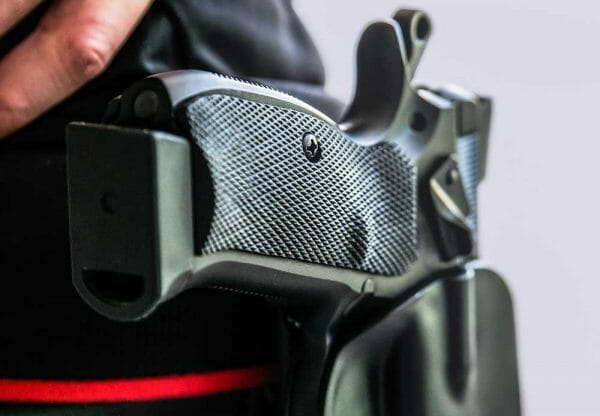
U.S.A. –-(AmmoLand.com)- On 27 October 2020, Judge Christopher Murry, at the Michigan Court of Claims, issued an opinion striking down Secretary of State Jocelyn Benson’s edict banning the open carry of guns at all polling places on election day. The edict was issued on 16 October. Tom Lambert and several right to bear arms groups sued to stop the order extra-legal order on 22 October 2020. From freep.com:
“The court’s duty is not to act as an overseer of the Department of State, nor is it to impose its view on the wisdom of openly carrying firearms at polling places or other election locations,” he said. “More importantly, its constitutional role is properly limited to only declaring what the law is, not what it should be.”
Murray handed down his ruling the same day the Detroit branch of the NAACP said its members and area attorneys will monitor polls across the city and state on Election Day and will report to police and prosecutors any instances of voter intimidation or voter suppression, including voters feeling threatened by gun-carrying individuals “watching” the polls.
Radical leftist Secretary of State Jocelyn Benson, and elected in the anti-Trump wave in 2018, and Attorney General Dana Nessel, issued statements saying they will appeal the decision.
There is already a state law banning voter intimidation at the polls. Benson’s ban on open carry is a blanket statement that defines open carry as voter intimidation.
Groups pushing for citizen disarmament have been trying to define open carry as illegitimate for decades. During the last three decades, organized open carry groups and civic-minded open carry individuals have been demonstrating exactly the opposite.
Open carry demonstrations have been some of the most peaceful and law-abiding, in spite of predictions of violence.
Assistant Attorney General Heather Meingast claimed the Secretary of State can issue an edict banning open carry at the polls because there is no state law specifically allowing open carry at the polls.
The Michigan Constitution limits the powers of the Secretary of State. The ability of the Secretary of State of issue regulations is covered by the Administrative Procedures Act (APA) of Michigan, as acknowledged by Judge Murry. Secretary of State Benson did not follow the APA, which renders the ban on open carry void, according to the lawsuit and the court opinion.
For the last hundred years, the ability of officials to issue law by dictat has been part of the power grab by Progressives, in their mostly successful attempt to move legislative power from the legislatures to administrative agencies. Requiring specific rulemaking procedures has been one method used to restrict the abuse of authority.
In this case, there is a direct conflict because of the separation of powers between the executive branch and the legislative branch. Republican Speaker of the House, Lee Chatfield applauded Judge Murray’s decision. From tribuneledgernews.com:
“Time after time the courts have struck down this administration when it overreaches,” Chatfield wrote on Twitter. “Firearms. Line 5. Redistricting. Vaping. Emergency powers. Nobody is above the law. It can’t be sidestepped. We have a democratic process. It needs to be followed.”
In his decision, Murray noted that the Democratic secretary of state’s prohibition on the open carry of firearms at polling places appeared to be more than an interpretation of existing statute. It was a rule that should be subjected to the rule-making process, he wrote.
The judicial branch (the court) has ruled the Secretary of State overstepped her authority. The Attorney General, Dana Nessel and Benson are appealing the decision to the Michigan Court of Appeals.
It is unknown if the appeal will be heard before the election, which is scheduled one week from the date the appeal was made.
About Dean Weingarten:
Dean Weingarten has been a peace officer, a military officer, was on the University of Wisconsin Pistol Team for four years, and was first certified to teach firearms safety in 1973. He taught the Arizona concealed carry course for fifteen years until the goal of Constitutional Carry was attained. He has degrees in meteorology and mining engineering, and retired from the Department of Defense after a 30 year career in Army Research, Development, Testing, and Evaluation.

